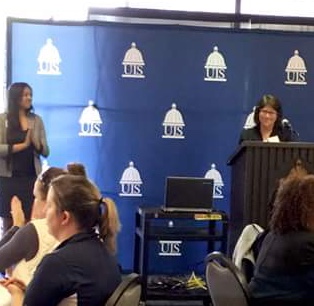Adviser reflects on 23 years in the game
By Debra Chandler Landis
Editor
Students can surprise us for the good and the bad.
As is inevitable in college media advising, I experienced both.
 And sometimes, we may forget that students arrive with life experiences, and as a result, may handle changes and challenges more readily than we might expect.
And sometimes, we may forget that students arrive with life experiences, and as a result, may handle changes and challenges more readily than we might expect.For example, this past spring, I dreaded, for whatever reason, telling the editor-in-chief and assistant editors of The Journal, the University of Illinois Springfield student newspaper, that i was retiring after 23 years on the job and that the university seemed to be moving at a snail’s pace to hire my successor. I wanted to tell then first before telling the entire Journal staff.
When I told the editor-in-chief about my upcoming retirement and plans to develop a home-based free-lance writing and editing business, she said something to the effect of, “Retirement isn’t a time for sadness. It’s a time to celebrate the person, recognize accomplishments, and consider opportunities ahead. We will have a party for you.”
One assistant editor said, “Debbie, you have to have a retirement plan. You like being busy.”
And another assistant editor said, “No way,” grinned and added, “Seriously, you are going to be missed. Thanks for everything you’ve done,” and then returned to editing.
That was that. No drama. Just some thanks and well-wishes–and recommendations–for retirement.
I have since retired, leaving numerous electronic and print resources and notes with individuals involved in the transition to a new student media adviser and a new school year.
Looking back on 23 years of college media advising, I recall a host of wonderful students and good experiences and can see in my mind the framed awards on the newsroom walls The Journal students won over those years.
I also recall how we advisers learn and grow, along with our students, when mistakes occur and all heck seems to be breaking loose.
One such lesson for Journal students and me involved a Journal guest column in which the writer said a Confederate flag hung in the window of a student’s campus apartment. The writer did not talk with Residence Life or the student with the alleged Confederate flag. However, she criticized the university for allowing a Confederate flag to be hung and called the owner of the flag a racist. The editor-in-chief erred in not insisting on a more informed commentary; had she, she and the writer would have learned the assumptions were wrong.
The alleged Confederate flag turned out to be a Norwegian flag. Pebbles were tossed at the student’s window, and the student understandably felt threatened. He demanded a retraction and the right to pen his own guest commentary for publication. The Journal editor-in-chief obliged.
Telling two media lawyers about what happened, they were polite but blunt in their responses to me: Calling an ordinary individual a racist in print, whether it’s a story, column, letter-to-the editor, or ad, can raise a red flag for potential libel, particularly if there was reckless disregard for the truth and reputation harmed.
Ever since that day, I incorporated that episode into annual staff orientations and periodic workshops, noting that all content can be potentially libelous and that student and professional journalists should be dogged and aggressive–just not reckless and foolish. A similar situation never occurred again.
The second lesson resulted from a lack of multi-cultural awareness — and a lack of sound reporting — by The Journal staff. In short, a Journal story about a hip-hop group performing at UIS was overloaded with background information critical of the group with no quotes from the student group who booked the band or the numerous students of diverse backgrounds who attended the concert and liked it.
When the front-page article was published, a flurry of angry e-mails and phone calls to The Journal quickly followed. Each e-mailer and caller said The Journal was racist and demanded an apology. The aftermath included the editorial board issuing a front-page apology and the editor-in-chief participating in a public forum with discussion of journalistic integrity, multi-cultural awareness, and hip-hop music..
Ensuing days found the entire Journal staff and I discussing how fragile trust and respect can be, and how they can be quickly eroded with a lack of sound journalistic planning and fair and accurate reporting. The Journal editor-in-chief stepped up coverage of stories of interest to students of diverse backgrounds, and strove to increase the diversity of The Journal staff . The story and public reaction were also incorporated into annual staff orientations and periodic workshops.
There’s an adage that says, “This, too, shall pass.”
Indeed, those painful situations passed, campus discussion critical of the Journal coverage of them waned, students graduated and started careers or pursued other degrees, new staff members were hired, and new stories published.
And I retired from UIS on June 30..

Looking ahead, I’ll edit CMR through the end of October, at which time a new editor will assume the duties. Be on the lookout for an announcement on the listserv yet this summer regarding the editor application process.
And, please keep in touch with CMR about popular articles and scholarly research you’d like to do: E-mail me at debchanland@gmail.com, or call or text me at 217-494-2095.
We look forward to hearing from you!
